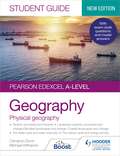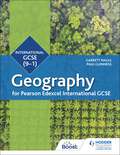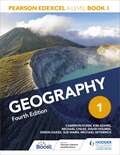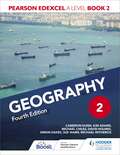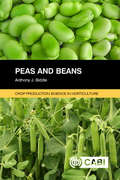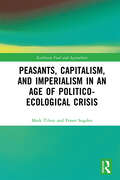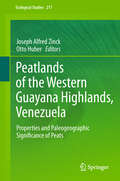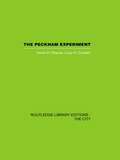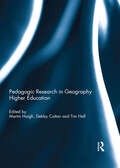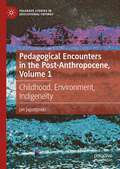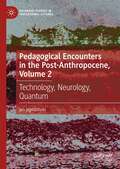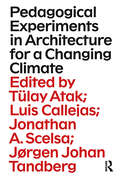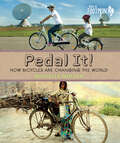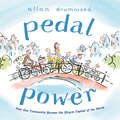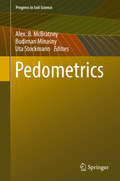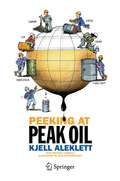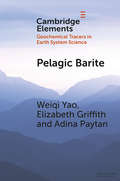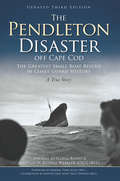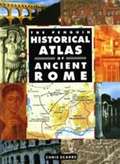- Table View
- List View
Pearson Edexcel A-level Geography Student Guide 1: Physical Geography
by Cameron DunnReinforce understanding throughout the course with clear topic summaries and sample questions and answers to help students target higher grades. Written by experienced subject experts Cameron Dunn and Michael Witherick, this Student Guide is divided into two key sections - content guidance, and sample questions and answers.Content guidance will: - Develop understanding of key concepts and terminology in key physical geography topics tectonic processes and hazards, landscape systems, processes and change (glaciated and coastal), the water cycle and water insecurity, and the carbon cycle and energy security. - Consolidate knowledge with 'knowledge check questions' at the end of each topic and answers in the back of the book.Sample questions and answers will: - Build understanding of the different question types, so that students can approach each question with confidence. - Enable students to target top grades in their exam paper with sample answers and commentary explaining exactly why marks have been awarded.
Pearson Edexcel A-level Geography Student Guide 1: Physical Geography
by Cameron DunnReinforce understanding throughout the course with clear topic summaries and sample questions and answers to help students target higher grades. Written by experienced subject experts Cameron Dunn and Michael Witherick, this Student Guide is divided into two key sections - content guidance, and sample questions and answers. Content guidance will: - Develop understanding of key concepts and terminology in key physical geography topics tectonic processes and hazards, landscape systems, processes and change (glaciated and coastal), the water cycle and water insecurity, and the carbon cycle and energy security. - Consolidate knowledge with 'knowledge check questions' at the end of each topic and answers in the back of the book. Sample questions and answers will: - Build understanding of the different question types, so that students can approach each question with confidence. - Enable students to target top grades in their exam paper with sample answers and commentary explaining exactly why marks have been awarded.
Pearson Edexcel International GCSE (9-1) Geography
by Garrett Nagle Paul GuinnessEndorsed by Pearson EdexcelWith clear and concise explanations, our student textbook covers all the key topics in the Pearson Edexcel International GCSE (9-1) Geography specification. From fragile environments to measuring human welfare, our textbook provides students with a deep understanding of each topic and ensures they are fully prepared for their exams.But it's not just about content knowledge - our Student Textbook is also packed with activities and questions, providing your students with plenty of opportunity to reinforce their learning and hone the skills required to succeed.This Pearson Edexcel endorsed Student Textbook:- develops understanding with thorough coverage of topics and contains summaries, diagrams and plenty of activities to direct thinking and aid revision - provides knowledge tests and exam practice questions at the end of each topic, with detailed guidance and example answers to help reinforce understanding - features up-to-date contemporary case studies, facts and figures, featuring UK and international examples, that build students' geographical skills and captures their interest- stretches, challenges and encourages independent thinking through clear and focused content that incorporates maps, graphs, GIS material and data sources.
Pearson Edexcel International GCSE (9-1) Geography
by Garrett Nagle Paul GuinnessEndorsed by Pearson EdexcelWith clear and concise explanations, our student textbook covers all the key topics in the Pearson Edexcel International GCSE (9-1) Geography specification. From fragile environments to measuring human welfare, our textbook provides students with a deep understanding of each topic and ensures they are fully prepared for their exams.But it's not just about content knowledge - our Student Textbook is also packed with activities and questions, providing your students with plenty of opportunity to reinforce their learning and hone the skills required to succeed.This Pearson Edexcel endorsed Student Textbook:- develops understanding with thorough coverage of topics and contains summaries, diagrams and plenty of activities to direct thinking and aid revision - provides knowledge tests and exam practice questions at the end of each topic, with detailed guidance and example answers to help reinforce understanding - features up-to-date contemporary case studies, facts and figures, featuring UK and international examples, that build students' geographical skills and captures their interest- stretches, challenges and encourages independent thinking through clear and focused content that incorporates maps, graphs, GIS material and data sources.
Pearson Edexcel A Level Geography Book 1 Fourth Edition
by Cameron Dunn Kim Adams David Holmes Simon Oakes Sue Warn Michael Witherick Michael ChilesCramming all new-case studies, new geographic data and reams of new questions, this new edition Pearson Edexcel A-level Geography student book will capture imaginations as it travels around the globe.This new book will help your students develop the geographical skills and knowledge they need to succeed. It has been written by our expert author team and structured to provide support for learners of all abilities. The book includes:· Activities and regular review questions to reinforce geographical knowledge and build up core geographical skills· Clear explanations to help students to grapple with tricky geographical concepts and grasp links between topics· Case studies from around the world to vividly demonstrate geographical theory in action· Exciting fieldwork projects that meet the fieldwork and investigation requirementsThis student book is supported by digital resources on our new digital platform Boost, providing a seamless online and offline teaching experience.
Pearson Edexcel A Level Geography Book 1 Fourth Edition
by Cameron Dunn Kim Adams David Holmes Simon Oakes Sue Warn Michael Witherick Michael ChilesCramming all new-case studies, new geographic data and reams of new questions, this new edition Pearson Edexcel A-level Geography student book will capture imaginations as it travels around the globe.This new book will help your students develop the geographical skills and knowledge they need to succeed. It has been written by our expert author team and structured to provide support for learners of all abilities. The book includes:· Activities and regular review questions to reinforce geographical knowledge and build up core geographical skills· Clear explanations to help students to grapple with tricky geographical concepts and grasp links between topics· Case studies from around the world to vividly demonstrate geographical theory in action· Exciting fieldwork projects that meet the fieldwork and investigation requirementsThis student book is supported by digital resources on our new digital platform Boost, providing a seamless online and offline teaching experience.
Pearson Edexcel A Level Geography Book 2 Fourth Edition
by Cameron Dunn Kim Adams David Holmes Simon Oakes Sue Warn Michael Witherick Michael ChilesCramming all new-case studies, new geographic data and reams of new questions, this new Pearson Edexcel A-level Geography student book will capture imaginations as it travels around the globe.This new book will help your students develop the geographical skills and knowledge they need to succeed. It has been written by our expert author team and structured to provide support for learners of all abilities. The book includes:· Activities and regular review questions to reinforce geographical knowledge and build up core geographical skills· Clear explanations to help students to grapple with tricky geographical concepts and grasp links between topics· Case studies from around the world to vividly demonstrate geographical theory in action· Exciting fieldwork projects that meet the fieldwork and investigation requirementsThis student book is supported by digital resources on our new digital platform Boost, providing a seamless online and offline teaching experience.
Pearson Edexcel A Level Geography Book 2 Fourth Edition
by Cameron Dunn Kim Adams David Holmes Simon Oakes Sue Warn Michael Witherick Michael ChilesCramming all new-case studies, new geographic data and reams of new questions, this new Pearson Edexcel A-level Geography student book will capture imaginations as it travels around the globe.This new book will help your students develop the geographical skills and knowledge they need to succeed. It has been written by our expert author team and structured to provide support for learners of all abilities. The book includes:· Activities and regular review questions to reinforce geographical knowledge and build up core geographical skills· Clear explanations to help students to grapple with tricky geographical concepts and grasp links between topics· Case studies from around the world to vividly demonstrate geographical theory in action· Exciting fieldwork projects that meet the fieldwork and investigation requirementsThis student book is supported by digital resources on our new digital platform Boost, providing a seamless online and offline teaching experience.
Peas and Beans
by Anthony J. BiddleThis practical book provides an accessible overview of all aspects of pea and bean production, including botany and physiology, breeding, agronomy, weed management, pests and diseases, harvesting, nutritional value and uses. It also reflects on the constraints and opportunities in the future for peas and beans, exploring their role in food sustainability and crop rotation, and various factors affecting supply and demand such as climate change and breeding technologies. Peas and beans are crops of economic, social and agronomic importance and this volume provides the specialist knowledge needed to ensure good quality standards are met. It includes: #65533; coverage of the main types of peas and beans grown on a significant scale or commercially produced in large area farming; #65533; key information relating to the role of peas and beans in biological nitrogen fixation; #65533; extensive coverage from the technology of cultivation to postharvest industry; and #65533; high-quality photos, presented in full colour throughout. Authored by a recognized authority with extensive experience in applied research, this book is an ideal resource for practical agronomists, advisors and producers, extension workers, horticulture students and all those involved in the production of peas and beans.
Peas and Beans: A Color Handbook (Crop Production Science in Horticulture)
by Anthony J BiddleThis practical book provides an accessible overview of all aspects of pea and bean production, including botany and physiology, breeding, agronomy, weed management, pests and diseases, harvesting, nutritional value and uses. It also reflects on the constraints and opportunities in the future for peas and beans, exploring their role in food sustainability and crop rotation, and various factors affecting supply and demand such as climate change and breeding technologies. Peas and beans are crops of economic, social and agronomic importance and this volume provides the specialist knowledge needed to ensure good quality standards are met. It includes: · coverage of the main types of peas and beans grown on a significant scale or commercially produced in large area farming; · key information relating to the role of peas and beans in biological nitrogen fixation; · extensive coverage from the technology of cultivation to postharvest industry; and · high-quality photos, presented in full colour throughout. Authored by a recognized authority with extensive experience in applied research, this book is an ideal resource for practical agronomists, advisors and producers, extension workers, horticulture students and all those involved in the production of peas and beans.
Peasants, Capitalism, and Imperialism in an Age of Politico-Ecological Crisis (Earthscan Food and Agriculture)
by Mark Tilzey Fraser SugdenThis book utilises a new theoretical approach to understand the dynamics of the peasantry, and peasant resistance, in relation to capitalism, state, class, and imperialism in the global South. In this companion volume to Peasants, Capitalism, and the Work of Eric R. Wolf, the authors further develop their thinking on agrarian transitions to capitalism, the development of imperialism, and the place of the peasantry in these dynamics, with special reference to the global South in an era of politico-ecological crisis. Focusing on the political role of the peasantry in contested transitions to capitalism and to modes of production outside of, and beyond, capitalism, the book contends that an understanding of these dynamics requires an analysis of class struggle and of the resources, material and discursive, that different classes can bring to bear on this struggle. The book focuses on the rise of capitalism in the global South within the context of imperial subordination to the global North, and the place of the peasantry in shaping and resisting these dynamics. The book presents case studies of contested transitions to agrarian capitalism in Bolivia, Ecuador, Guatemala, Mexico, Peru, and South Asia. It also examines the case of transition to a post-capitalist mode of production in Cuba. The book concludes with an assessment of the nature of capitalism and imperialism within the context of the contemporary politico-ecological crisis, and the potential role of the peasantry as agent of emancipatory change towards social and environmental sustainability. This book will be of great interest to students and researchers in the areas of peasant studies, rural politics, agrarian studies, development, and political ecology.
Peatlands of the Western Guayana Highlands, Venezuela
by Joseph Alfred Zinck Otto HuberThe Guayana Highlands in northeastern tropical America, rising from lowland rain forests and savannas up to 3000 m elevation, are characterized by ancient tablelands called tepuis. The peatlands that developed on the tepuis constitute unique and fascinating ecosystems and are the focus of this volume, which starts with an overview of tropical and subtropical peats, followed by an introduction to the geo-ecological features of the Guayana region as a whole, with special emphasis on the diversity of the vegetation cover from lowlands to uplands to highlands. The core subject centers on the properties and dating of the peat deposits and the interpretation of the chronological record in terms of past environmental changes. The well illustrated book will appeal to a broad range of scientists interested in tropical highland peats, including quaternarists, soil scientists, geomorphologists, geographers, geologists, ecologists, botanists, hydrologists, conservationists, and land use planners.
The Peckham Experiment: A study of the living structure of society
by Innes H. Pearse Lucy H. CrockerFirst published in 2006. Routledge is an imprint of Taylor & Francis, an informa company.
Peculiar Primates: Fun Facts About These Curious Creatures
by Debra Kempf ShumakerFrom flossing and howling, to building nests and thumping chests, this delightful follow up to Freaky, Funky Fish explores the amazing things primates do. All primates climb and breathe in air. They have big brains and hands and hair. But. . . some live alone, some live in groups. One primate has a nose that droops. Peculiar Primates is an adorable picture book with a scientific—and child-friendly—underpinning. With examples of different primates for each description, as well as extensive backmatter explaining the fascinating science behind their behaviors, this bizarre book captures the wonders of our ecosystem.
Pedagogic Research in Geography Higher Education
by Martin Haigh, Debby Cotton and Tim HallThere are many books about teaching in Geography, but this is the first dealing specifically with Pedagogic Research, its methods and practices. Pedagogy research concerns the processes of learning and the development of learners. It is a learner-centred activity that aims to evaluate and improve the ways that students learn and learn to manage, control and comprehend their own learning processes, first as Geographers in Higher Education but equally as future educated citizens. This book collects together some key research papers from the Journal of Geography in Higher Education. They concern original research and critical perspectives on how Geographers learn, critical evaluations of both new and traditional frameworks and methods used for Pedagogic research in Geography, and some case studies on the promotion of self-authorship, learner autonomy, in key Geography Higher Education contexts such as fieldwork and undergraduate project work.This book is a compilation of articles from various issues of the Journal of Geography in Higher Education.
Pedagogical Encounters in the Post-Anthropocene, Volume 1: Childhood, Environment, Indigeneity (Palgrave Studies in Educational Futures)
by jan jagodzinskiThis volume, the first of a two volume set, addresses three major areas in response to the post-Anthropocene: childhood, environment and indigeneity. Each of these areas is broadly addressed in relation to the concerns that have arisen both theoretically and educationally. The author terms these to be encounters as each area presents a particular problematic when addressing the phase change that the planet is undergoing where the anthropogenic labour of global humanity is contributing to climate change, endangering our very existence. There has been a concerted effort to overcome the nature-culture divide in education. The author reviews this development in the first section where there has been a particular emphasis placed on childhood education. In the second section he turns to the pedagogical theories that are attempting to overcome this same divide in environmental and science education. The last section attempts to bring into the conversation the vast literature on Indigeneity and their attempts to revise traditional education to meet these extraordinary times.
Pedagogical Encounters in the Post-Anthropocene, Volume 2: Technology, Neurology, Quantum (Palgrave Studies in Educational Futures)
by jan jagodzinskiAs a follow up to Pedagogical Encounters in the Post-Anthropocene, Volume I, this book addresses three major areas in response to the post-Anthropocene: Technology, Neurology, Quantum. Each of these areas is broadly addressed in relation to the concerns that have arisen both theoretically and educationally. As in Volume I, the author terms these to be encounters as each area presents a particular problematic when addressing the phase change that the planet is undergoing where the anthropogenic labour of global humanity is contributing to climate change, endangering our very existence. Technology in education has been a significant development. There is a concerted effort to review this development placing stress on the rise of learning machines and algorithms. In the second encounter the vast literature on neurology is addressed, especially neurodiversity and the various symptoms that have emerged in the post-Anthropocene era. The last section reviews issues related to quantum theory as this is fundamental to tensions between physics and metaphysics. The volume concludes with the author’s own pedagogical proposal for the future.
Pedagogical Experiments in Architecture for a Changing Climate
by Tülay Atak Luis Callejas Jonathan Scelsa Jørgen TandbergThis book presents a series of pedagogical experiments translating climate science, environmental humanities, material research, ecological practices into the architectural curriculum. Balancing the science and humanities, it exposes recent pedagogical experiments from renown educators, while also interrogating a designer’s agency between science and speculation in the face of climate uncertainty. The teaching experiments are presented across four sections: Abstraction, Organization, Building, and Narrative, exposing core parts of an architect’s education and how educators can simultaneously provide fundamental skills and constructive literacy while instigating environmental sensibilities. Chapters cover issues such as an unstable hydrosphere, water infrastructure, remediating materials, methods of disassembly and adaptive reuse, as well as constructing new aesthetic categories of climate change, and implementing oral histories of construction, among many others. Written and edited by expert design educators actively engaged in experimenting in new forms of pedagogy, this book will be of great use to architecture instructors at all levels looking to renew their teaching practices to more directly address the climate emergency. It will also appeal to those academics across the built environment interested in the ways design can affect and adapt to climate change.
Pedal It!: How Bicycles are Changing the World (Orca Footprints #2)
by Michelle MulderPedal It! celebrates the humble bicycle and shows you why and how bikes can make the world a better place From the very first boneshakers to the sleek racing bikes of today, from handlebars to spokes to gear sprockets, bicycles have continued to capture our collective fascination. Not only can bikes be used to power computers and generators, but they can also reduce pollution, promote wellness and get a package across a crowded city—fast! Informative but not didactic, Pedal It! encourages young readers to be part of the joy of cycling.
Pedal Power: How One Community Became the Bicycle Capital of the World (Green Power)
by Allan DrummondCycling rules the road in Amsterdam today, but that wasn't always the case. In the 1970's, Amsterdam was so crowded with vehicles that bicyclists could hardly move, but moms and kids relied on their bicycles to get around the city. PEDAL POWER is the story of the people who led protests against the unsafe streets and took over a vehicles-only tunnel on their bikes, showing what a little pedal power could do! Author and illustrator Allan Drummond returns with the story of the people that paved the way for safe biking around the world.
Pedometrics (Progress In Soil Science Ser.)
by Uta Stockmann Budiman Minasny Alex. B. McBratneyThis book presents the basic concepts of quantitative soil science and, within this framework, it seeks to construct a new body of knowledge. There is a growing need for quantitative approach in soil science, which arises from a general demand for improved economic production and environmental management. Pedometrics can be defined as the development and application of statistical and mathematical methods applicable to data analysis problems in soil science. This book shows how pedometrics can address key soil-related questions from a quantitative point of view. It addresses four main areas which are akin to the problems of conventional pedology: (i) Understanding the pattern of soil distribution in character space – soil classification, (ii) Understanding soil spatial and temporal variation, (iii) Evaluating the utility and quality of soil and ultimately, (iv) Understanding the genesis of soil. This is the first book that address these problems in a coherent quantitate approach.
Peeking at Peak Oil
by Michael Lardelli Olle Qvennerstedt Kjell AleklettThe term "Peak Oil" was born in January 2001 when Colin Campbell formed the Association for the Study of Peak Oil & Gas (ASPO). Now, Peak Oil is used thousands of times a day by journalists, politicians, industry leaders, economists, scientists and countless others around the globe. Peak Oil is not the end of oil but it tells us the end is in sight. Anyone interested in food production, economic growth, climate change or global security needs to understand this new reality. In Peeking at Peak Oil Professor Kjell Aleklett, President of ASPO International and head of the world's leading research group on Peak Oil, describes the decade-long journey of Peak Oil from extremist fringe theory to today's accepted fact: Global oil production is entering terminal decline. He explains everything you need to know about Peak Oil and its world-changing consequences from an insider's perspective. In simple steps, Kjell tells us how oil is formed, discovered and produced. He uses science to reveal the errors and deceit of national and international oil authorities, companies and governments too terrified to admit the truth. He describes his personal involvement in the intrigues of the past decade. What happens when a handful of giant oil fields containing two thirds of our planet's oil become depleted? Will major oil consumers such as the EU and US face rationing within a decade? Will oil producing nations conserve their own oil when they realize that no one can export oil to them in the future? Does Peak Oil mean Peak Economic Growth? If you want to know the real story about energy today and what the future has in store, then you need to be "Peeking at Peak Oil".
Pelagic Barite: Tracer of Ocean Productivity and a Recorder of Isotopic Compositions of Seawater S, O, Sr, Ca and Ba (Elements in Geochemical Tracers in Earth System Science)
by Weiqi Yao Elizabeth Griffith Adina PaytanReconstruction of ocean paleoproductivity and paleochemistry is paramount to understanding global biogeochemical cycles such as the carbon, oxygen and sulfur cycles and the responses of these cycles to changes in climate and tectonics. Paleo-reconstruction involves the application of various tracers that record seawater compositions, which in turn may be used to infer oceanic processes. Several important tracers are incorporated into pelagic barite, an authigenic mineral that forms in the water column. Here we summarize the utility of pelagic barite for the reconstruction of export production and as a recorder of seawater S, O, Sr, Ca and Ba.
The Pendleton Disaster Off Cape Cod: The Greatest Small Boat Rescue in Coast Guard History, A True Story (Disaster)
by Theresa Mitchell Barbo Captain W. Russell WebsterA first-hand account and fascinating new details of the 1952 rescue of the SS Pendleton, the true story behind the film The Finest Hours.On February 18, 1952, off the coast of Cape Cod, a fierce nor’easter snapped in half two 503-foot oil tankers, the Pendleton and the Fort Mercer. Human grace and grit, leadership and endurance prevail as Theresa Mitchell Barbo and Captain W. Russell Webster (Ret.) recount the historic, heroic rescue of thirty-two merchant mariners from the sinking Pendleton by four young Coast Guardsmen aboard the 36-foot motor lifeboat CG 36500. A foreword by former Commandant Admiral Thad Allen (Ret.) and an essay by Master Chief John “Jack” Downey (Ret.), a veteran of thousands of modern-day small boat rescues, round out the special third edition of this classic work on Coast Guard history.
The Penguin Historical Atlas of Ancient Rome
by Chris ScarreThe Penguin Historical Atlas of Ancient Rome is an introduction to the Roman Empire based on maps.
